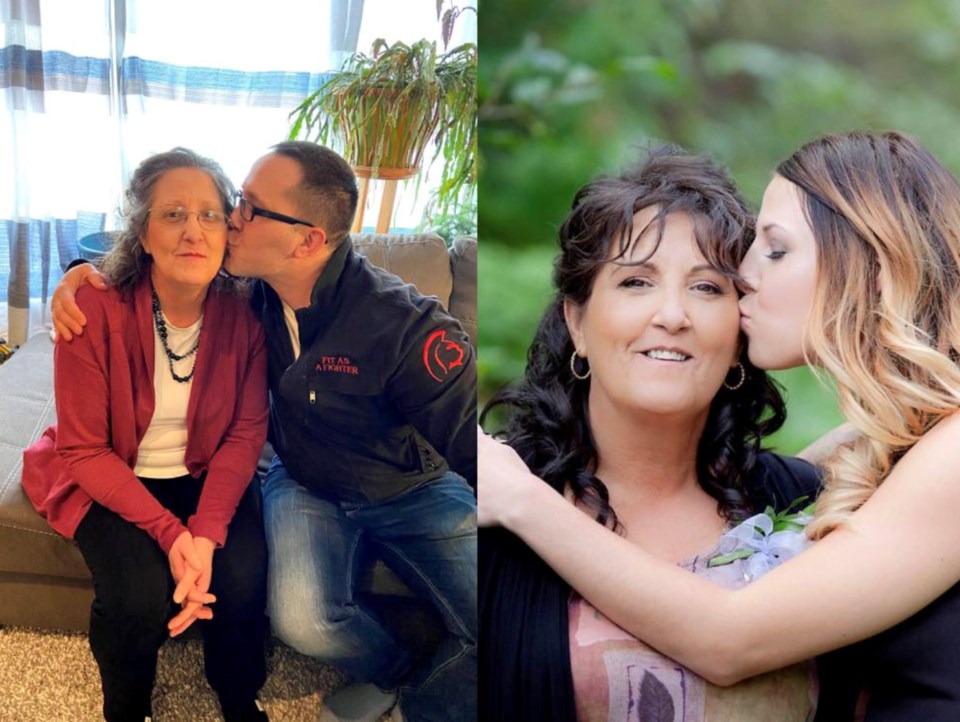“The lack of care our mother received at Simon Fraser Lodge robbed us of the time we had left together.”
As seen in Prince George Citizen by Moira Wyton, 30th January 2023.

Kelly Ashton was 62 and living with early-onset dementia when she died. She is loved and missed by her three children, including Jason Keller, with Ashton at left, and Santaya Garnot, with Ashton in an earlier photo at right. // Submitted
Kelly Ashton was 62 when she died in Prince George hospice on Dec. 1. Her official cause of death was natural causes, but her son Jason Keller and daughter Santaya Garnot are alleging their mother’s death was wrongful.
Ashton, a long-term care resident, fell and bumped her head twice on Nov. 9. But she was not seen in person by a doctor until her children insisted she go to the hospital on Nov. 11.
The siblings say her death was a result of negligence on behalf of Simon Fraser Lodge, a private long-term care facility contracted by Northern Health and run by Buron Healthcare Ltd. in Prince George.
“She had dementia, but otherwise she wasn’t unhealthy,” said Garnot.
The siblings want to know why their mother wasn’t seen by a doctor in person or transferred to hospital earlier.
“When you have a loved one with dementia, every moment of their time with you is precious,” said Keller. “The lack of care our mother received at Simon Fraser Lodge robbed us of the time we had left together.”
“Our mother passed away and we want to know what happened.”
While a representative from Buron Healthcare, which operates Simon Fraser Lodge, declined to comment on the particulars of Ashton’s case, citing privacy concerns, she noted that they take all incidents seriously. Buron Healthcare’s vice-president of operations, Michele Thomson, wrote that Buron Healthcare is “always open to reviewing and updating policies and procedures as required.” She noted the lodge has protocols for preventing and dealing with falls in place.
Ashton was living with early-onset Alzheimer’s. She had two falls in a single day before she died.
On Nov. 9, she had been agitated and wandering, according to an investigation by the long-term care facility. Staff found her bruised and bleeding from a bump on her head around 4a.m. in the common living room.
Ashton couldn’t get up on her own from the fall, but an assessment by a nurse found no concerns, according to an internal investigation summary. Staff reassured her son Keller she was alright when he came to check on her later in the morning of Nov. 9.
That afternoon, Ashton complained of head pain. She fell again in the early evening. Staff found her on her hands and knees in front of a yellow caution sign placed on the hallway floor around 6:20 p.m., the report said. There was a second large and bruising bump on her head.
Facility staff again found no concerns in a post-fall assessment, and when they consulted the doctor over the phone, he did not recommend she go to hospital. Staff assured Keller and his sister Garnot that their mother didn’t need further medical care and would be seen by the doctor when he was in next. Garnot agreed to the use of a restraint and a wheelchair to prevent future falls, a solution recommended over the phone by the doctor.
But by Nov. 11, Keller said Ashton was “out of it,” hunched over with her head tilted forward. She had not yet been seen by the doctor in person. Her children insisted she go to the hospital to be examined, and over the phone, the doctor authorized her transfer to hospital via ambulance.
Shortly after she was admitted to the University Hospital of Northern British Columbia in Prince George, doctors diagnosed her with a concussion and two fractured vertebrae in her neck.
Ashton received a neck brace and was stabilized in hospital, but died just weeks later in hospice on Dec. 1.
Meanwhile the family’s pursuit of answers and accountability has been complicated by British Columbia’s wrongful death laws, which limit their options for legal recourse. In the case of wrongful deaths, families in B.C. can sue individuals and entities they believe are at fault on their loved one’s behalf.
The Wills, Estates and Succession Act establishes that right but limits the damages families can seek to economic costs only.
And the Family Compensation Act specifies those economic damages are limited to lost future income upon which dependents relied and any funeral and burial costs associated with the death.
The legislation does not allow families to sue for their or their loved ones’ pain and suffering or seek punitive damages if they allege gross negligence.
“What that basically says is that if you are not a breadwinner, with young children, your life is worthless,” said Michael-James Pennie, president of the BC Wrongful Death Law Reform Society. “That means that anyone who does not meet that discriminatory criteria has no legislative protection under the law.”
Learning that they have no legal avenue to sue for wrongful death because their mother did not support them financially has compounded the family’s grief, Garnot and Keller said.
Keller and Garnot said they plan to file complaints with the Northern Health Patient Care Quality Office and the College of Physicians and Surgeons of British Columbia against the doctor who did not recommend Ashton go to hospital. They are mulling other paths to justice, such as a Charter challenge, which would allege their mother’s right to life, liberty and security of person was violated by Simon Fraser Lodge and again by B.C.’s legislation.

 ‘In Their Name’ is the campaign of ‘The BC Wrongful Death Law Reform Society’ – a BC registered non-profit organization comprised of volunteer families who have lost a loved one to wrongful death in BC and were denied access to justice. In response to the biggest human rights issue facing the province today, our goal is to modernize British Columbia’s antiquated wrongful death legislation, which predates confederation (1846). Under current legislation, the value of a human life is measured only by the deceased’s future lost income, so long as they had dependents.
‘In Their Name’ is the campaign of ‘The BC Wrongful Death Law Reform Society’ – a BC registered non-profit organization comprised of volunteer families who have lost a loved one to wrongful death in BC and were denied access to justice. In response to the biggest human rights issue facing the province today, our goal is to modernize British Columbia’s antiquated wrongful death legislation, which predates confederation (1846). Under current legislation, the value of a human life is measured only by the deceased’s future lost income, so long as they had dependents.